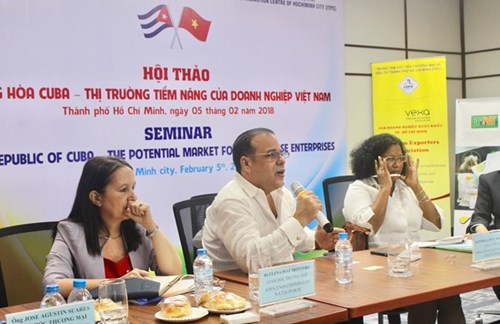Pham Thiet Hoa, Director of the Ho Chi Minh City Investment and Trade Promotion Centre, said Vietnam and Cuba boast sound traditional relations along with expanding economic and trade ties. Vietnam is now one of the 10 biggest trade partners of Cuba and also the second largest Asian trade partner of the Latin American nation.
However, bilateral trade remains modest compared to the two countries’ demand and potential, he noted, elaborating that Vietnam’s exports to Cuba are estimated at USD 240 million per year, accounting for only 3.5 percent of Cuba’s total annual trade – nearly USD 7 billion. Hence, there remains much room for Vietnamese firms to invest in and trade with Cuba.
Hoa noted Cuba has big demand for food, consumer goods, footwear, textile-garment, and computer devices, which are also the strengths of Vietnam. Meanwhile, it is strong at pharmaceuticals, training, health care, and construction, which the Southeast Asian nation is interested in.
    |
 |
|
Cuban officials answers participants' questions at the seminar on February 5 |
Promoting investment in and trade with Cuba will also help Vietnamese enterprises to access the vast market of the Latin American and Caribbean region.
Indira Lopez Arguelles, Cuban Consul General to HCM City, said her country’s economy has improved in recent years with annual growth rate maintained at 4 – 5 percent. A stronger economy has also encouraged consumption in Cuba while the country still has to import most of consumer goods. This is a good opportunity for Vietnamese businesses to enhance exports to the country, especially rice, apparel, footwear, and computers.
The sound bilateral friendship is an advantage for Vietnamese firms, she said, adding that the two countries are preparing to sign a bilateral free trade agreement to remove tariff barriers and bolster trade.
However, there remain certain obstacles to bilateral trade.
Tran Ngoc Thuan, Deputy General Director of the Thai Binh Investment – Trade Company, which has had investment and trade ties with Cuba for 20 years, said the biggest barrier is the geographical distance, which will augment transportation costs. Due to financial difficulties, Cuba importers’ payment also usually lasts for more than one year.
He said Cuba needs to shorten the payment period. Meanwhile, Vietnamese companies should learn about their partners’ transaction habits thoroughly while preparing appropriate capital and long-term strategies for investment in Cuba.
Indira Lopez Arguelles said Cuba promotes import activities, but in the long term, it will prioritize attracting investment to develop domestic production. She suggested Vietnamese firms develop production and distribution in her country so as to ensure long-term development in this market.
Source: VNA